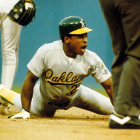
Here's a dirty little secret about Major League Baseball: almost every player gets asked about in trade talks. Yes, even your favorite homegrown All-Star who simply must finish their career in town. It doesn't mean those players are being shopped, or that there's a realistic chance of a deal occurring; it's just how front offices gain insight into their players' trade values and their options.
Keep that in mind whenever you read rumors this winter, and especially when they pertain to a player like Bo Bichette, the Toronto Blue Jays' two-time All-Star shortstop. Bichette, 25, is sporting a 126 OPS+ through 528 career big-league games and has amassed more than 14 Wins Above Replacement the last three seasons, according to Baseball-Reference's calculations.
You can understand why teams would ask. You can also understand why, according to what a rival talent evaluator familiar with the marketplace told CBS Sports, the Blue Jays would be able to fetch a big-time return if they did get serious about moving him.
As silly as this may sound, you can also understand why the Blue Jays would listen to offers on Bichette. And, if you can't, then we encourage you to read on. Below, we've highlighted three other reasons why Toronto should have an open mind about a Bichette trade this winter, as well as one reason we think they'll abstain from making a deal.
1. Weak shortstop market
Anyone who has endured a business class knows two things to be true: 1) they're almost always a waste of time; and 2) supply is eternally linked with demand. Everyone might agree that this or that skill set is worth so much when supply isn't taken into account; limit the supply to one here or there, though, and if the skill set is desirable enough the price is sure to increase. At the risk of getting frivolous about it: you see this spot where these two curves intersect? That's why the Blue Jays should field offers on Bichette from other teams.
But, on a more serious note, this winter's infield market is wretched. Tim Anderson, coming off the worst season of his career, was the lone middle infielder to make the front half of CBS Sports' top-50 free-agent rankings. Gio Urshela and Amed Rosario were the only others with middle-infield capacities to crack the top 50. Neither is a certainty: Urshela, traditionally a third baseman, is recovering from a fractured pelvis; Rosario has long been a shortstop in name only whose league-average bat loses value elsewhere.
The trade market appears more favorable in that respect -- especially if the Brewers decide to move Willy Adames ahead of his walk year, or the Orioles start to unpack their middle-infield depth chart ahead of Jackson Holliday's arrival. Bichette would still stand out as the top available shortstop. That alone isn't a compelling reason to move Bichette. It is, however, a useful designation that can help coerce a greater return than normal from interested parties.
2. The clock is ticking
In baseball, the end is always closer than it appears. Eventually, every member of a team's core -- even the innermost circle of that core -- will depart through trade, free agency, or retirement. That's how it goes.
Bichette, who has been part of the Blue Jays organization since 2016, is inching ever so closer to leaving town through one avenue or another.
That's because Bichette is scheduled to hit free agency after the 2025 season. The Blue Jays reached an agreement with him in the spring on a three-year contract that covered his remaining arbitration years. That pact, notably, did not include any of Bichette's free-agent seasons. Last winter, top Blue Jays executive Mark Shapiro made the following statement when asked about the possibility of signing any of Toronto's young stars to long-term deals.
"The closer they get to free agency, the more that changes their equation of risk," Shapiro told MLB.com. "It makes them probably less willing to give up the risk of what it means to be out there. The timing, it impacts the sharing of the risk and that sweet spot equation. I think that's the right word. We're looking for the sweet spot."
Perhaps the Blue Jays will be able to find the sweet spot with Bichette that carries him beyond the 2025 season. We think, at this stage, that the alternative must be considered. Bear in mind that even if Bichette were to accept the same deal as Dansby Swanson signed last offseason -- that is, seven years and $177 million -- it would shatter George Springer's record (six years, $150 million) for the largest contract in Blue Jays franchise history. That's without accounting for the likelihood that Bichette would be able to demand (and receive) significantly more by the time he's open for business.
The Blue Jays organization can certainly afford to keep Bichette for the long haul. That doesn't mean they'll acquiesce and give him what he deserves. Until that's no longer in question, each passing day brings them closer to the end.
3. Change may be needed
Fairly or not, this iteration of the Blue Jay seems to annually fall short of expectations. They've finished third or fourth in six of the last seven seasons, and they haven't won a single playoff game since 2016 -- instead, they've posted an 0-6 record over three postseason berths. The Blue Jays have changed managers and swaths of their roster in the last five years; it hasn't mattered.
There are two conclusions one can draw about this Toronto core after all these years: either the expectations have been unrealistic or there's a fatal flaw in the roster that holds them back. Whichever way you lean, it's a situation that necessitates a response -- by making the roster better, or by making it less susceptible to underachievement.
The Blue Jays front office has attempted to do at least the former by signing Springer, retaining Kevin Gausman, and trading for Matt Chapman and José Berríos, among others. (Granted, you can argue they should've done more, or that they should have operated at a grander scale.) For all the additions they've made, nothing has been able to help the Blue Jays achieve the desired outcome. Now, Toronto will be faced with an offseason that could see them lose Chapman, Kevin Kiermaier, and Brandon Belt -- three of their top 10 performers last season, as judged by Baseball-Reference's Wins Above Replacement metric.
Trading Bichette would qualify as a step toward resetting, be it out of desire or necessity. We doubt Toronto's front office feels like going that route this winter, but if they do ... well, fair enough.
But will they really move him?
We just spent three subheadings making it clear that Bichette is a really good player at a position where it's hard to acquire really good players; that he's under team control at a set cost for another two seasons; and that he's probably not the reason the Blue Jays continue to underperform.
There are reasonable arguments for listening to offers, but even in concert they don't have us convinced the Blue Jays should do a deal.
After all, the Blue Jays are better with Bichette than they would be without him, to the extent that it would take a Godfather-style offer to get them across the goal line. And that's why they, and every other team, will keep taking calls on all of their best players -- because you just never know when one of those is going to be presented to you, morphing the improbable into the undeniable.


















